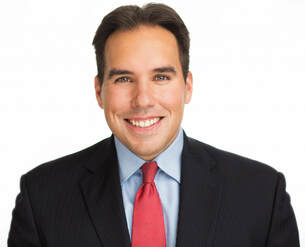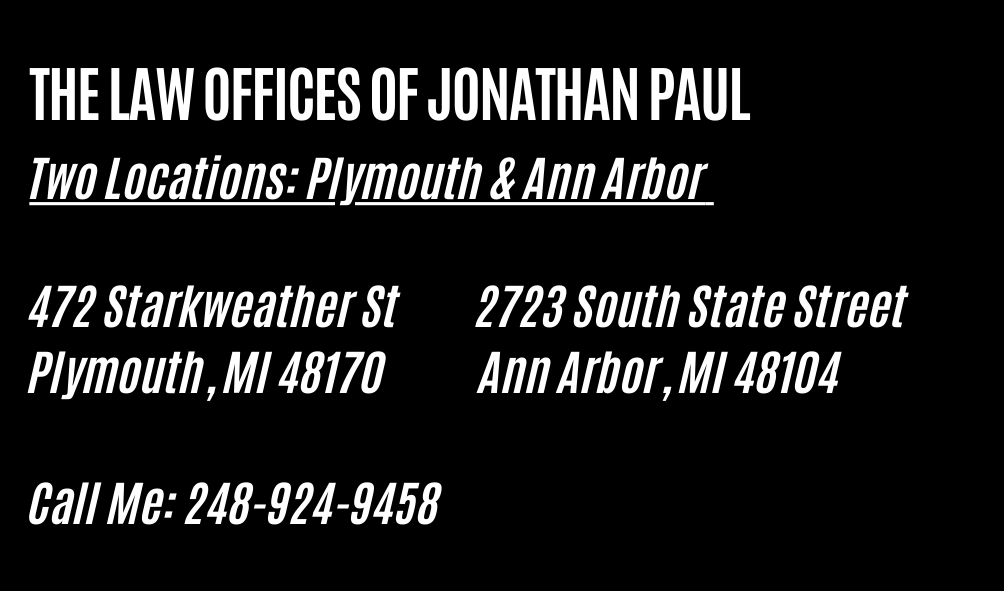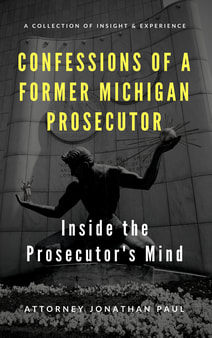|
Q. Can I travel during my case? Your attorney must gain permission from the judge. This request is usually granted, but it really depends upon your charge, your criminal history, and where you want to travel. It is more likely you will be granted permission to leave the state rather than the country, but both are possible. Speak to your attorney about your travel plans.
Q. What does discovery mean? In a criminal case, this means all the paperwork and evidence in possession of the police department and prosecutor. There may be additional discovery from a third party such as a hospital, bank or pawn shop to name a few. The main piece of discovery is the police report. The discovery process is ongoing, and new information may become available during the pendency of your case. Q. What's a prosecutor? The prosecutor is a representative of the state, county, city or township that has brought charges against you. You could be dealing with an elected prosecutor of a county, or a hired local prosecutor. Depending upon the county, you will be dealing with assistant prosecutors hired by the elected prosecutor to represent him/her in court. Q. Is a magistrate the same thing as a judge? A magistrate generally attends to arraignments and traffic offenses. If you're arraigned on a new charge, you may appear before a magistrate rather a judge. A magistrate is generally not elected like a judge, but they have incredible power to affect the course of your case. You should show a magistrate the same respect as a judge, and address them as "your honor". Q. Can I bring a friend or family member to court? Yes, the courtroom is open to the general public, so you can bring anyone to court for support. Having a friend or family member in court can be very comforting to a first offender. Now is it necessary to have a family or friend in court? No it is not. A lot of parents call me and ask whether they should fly in for court appearances; while it is certainly allowed, it is not necessary. Having a friend or family member in court will have no impact on your case, expect for possibly your sentencing where your attorney can argue that you have a great support system, and you've brought them to court. Q. How long will I have a criminal record? Some crimes cannot be removed from your criminal record (traffic offenses including drunk driving). Some offenses can be expunged off of your record after five years, as long as you meet other requirements. If you're a first offender, there are a number of deferred sentence opportunities, which if you successfully complete the terms of your sentence, you will not have a criminal record. Q. Am I ever going to get a job? If you're charged with a crime, or are ultimately convicted of a crime, this could affect your ability to keep a job, or get a new job. Certain crimes like drunk driving could affect your ability to drive a vehicle. A conviction for assault or domestic violence can be particularly troubling for gaining future employment. The biggest barrier to obtaining employment is a felony conviction. Q. Where's the courthouse? If you are scheduled for court then the court house address should be listed on the appearance notice. If not, you can put the name of the court into Google, and you will be provided with the address. Here is a helpful link for researching the different courts around Michigan. Simply click on the county, and you will be provided with a list of all the courthouses in the county. Q. What should I wear to court? You should dress like you're going to meet the President of the United States, or going on a professional job interview. You only get to make a first impression once; the judge and prosecutor will be looking at your attire. We will discuss the specifics of what you should wear for court. Your attire should be an asset to resolving your case in a favorable way, not a hinder to success. Q. Will I have to speak in court? For arraignment and pre-trial court dates, you will have to say very little in court. Be prepared to say "yes your honor" and "no your honor". If you're pleading to a charge or being sentenced, then I will prepare you for what you will need to say. The only time you will speak more than a few sentences is if your case goes to trial, and you take the witness stand in your own defense. Q. How long will my court date last? Most people are surprised to find out that a court appearance is 95 percent waiting and 5 percent action. If your case is set for 1 pm, you might not have your case called until 2:30 pm. Once your case is called, unless there is a pre-trial hearing or a trial, you will stand before the judge from anywhere between 30 seconds and 10 minutes. A lot of the negotiation and discussion happens prior to or after your case happens. Q. Why did my lawyer go speak to the judge without me? This is called a bench conference where your attorney may want to speak to the judge and prosecutor without making a record. Some things are better discussed outside of the ear of the public, and not on an official court record. Good plea deals, favorable sentences, and strong advocacy happens at the bench. This is not something to be worried about. If you really want to hear the conversation, you are entitled to approach the bench as well, but it is usually more effective to allow your attorney the chance to speak to the judge and prosecutor without you present. Q. Am I going to jail or prison? Most first offenders who commit misdemeanor offenses do not go to jail. This statement is thrown out the window in certain courthouses, and in front of certain judges. If you're charged with a felony, then all bets are off; Michigan felonies are subject to the Michigan sentencing guidelines. Certain felonies have mandatory prison, which cannot be avoided. Q. Is my case going to be a trial? Most cases do not go to trial, but going to trial is not something to fear. If you've been charged with a crime, and the facts do not meet the elements of the offense, then a trial may be appropriate in your case. You can have a trial by judge or jury. Each type of trial has it's relative strengths and weaknesses. Comments are closed.
|
Click to Email Me Categories
All
|
Ann Arbor Office LocationPlymouth Office Location |
Representing DUI Clients in MichiganRepresenting clients charged with a DUI in Ann Arbor, Canton, Brighton, Howell, Saline, Adrian, Taylor, Plymouth, Northville, Westland, Ypsilanti, Pittsfield Towsnhip, Warren, Sterling Heights, Farmington, Pontiac, Romulus, Lansing, Novi, South Lyon, Southfield, Birmingham, Bloomfield Hills, Royal Oak, Troy, Rochester, Jackson, East Lansing, Garden City, Livonia, Dearborn, Detroit, St Clair Shores, Hazel Park, Ferndale, Madison Heights, Waterford, Milford, Shelby Township Clarkston, Oak Park, Berkley, Fraser, Sterling Heights, Clinton Township and others throughout Washtenaw, Wayne, Monroe, Jackson, Genesee, Macomb, Ingham, Lenawee, Livingston and Oakland County.
|








